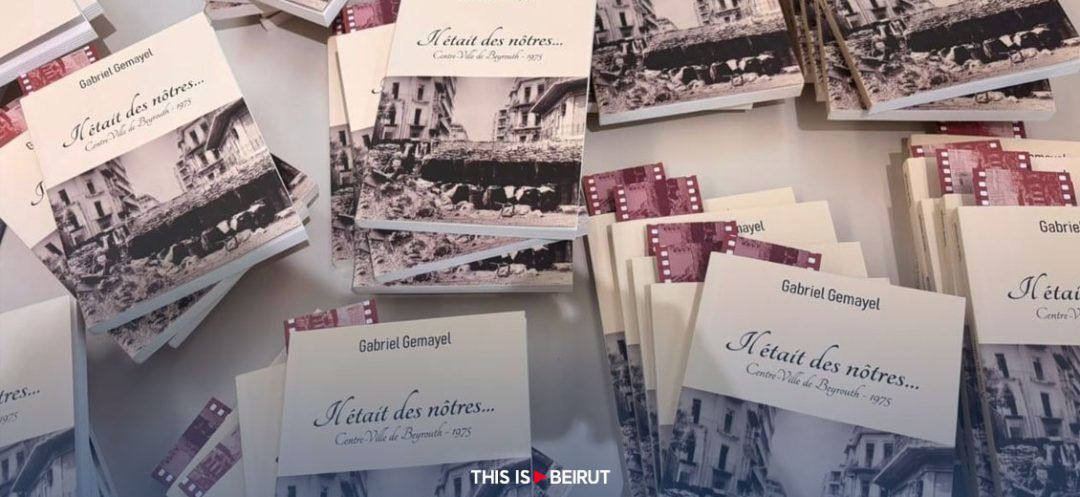
Il était des nôtres, centre-ville de Beyrouth - 1975 is a captivating and moving book by Gabriel Gemayel, echoing the suffering of the martyrs of a Lebanon torn by conflict. This work stands as a duty of collective memory, breaking the silence surrounding all those who have disappeared and their “empty graves.” The first signing session took place on April 13, 2023, at the Georges Corm Foundation, and the second will be held on May 16 at Tribu, from 5:00 PM to 7:30 PM.
Il était des nôtres, centre-ville de Beyrouth - 1975 traces the journey of a father who was shot and disappeared during the fighting in Downtown Beirut, as well as his son’s desperate quest to find him forty-one years later. The narrative is paced by chapter titles drawn from La Marseillaise. The author turns back the hands of time and slips into the past as a detective, warrior, or missionary. His goal? To reunite father and son, beyond the beyond, and “to pay the debt of a father who had come to fight in Lebanon…”
“Hello. My father died in Lebanon in 1975. His name was Dominique Borella. He was fighting for Gemayel…” It all started with a message sent to Georges Boustany on his Facebook page, The War in Lebanon Day by Day, brimming with archived photos of Beirut. Thus was born the book by Gabriel Gemayel. The work is historical and romanticized, with a vivid style, infused with humor and poetry, with a rhythm both staccato and fluid, intertwining the little story within the great, like a bracelet.
This is Beirut met the author-detective, driven by his determination to seek the truth, his quest for this “idealistic human answering the call of duty,” with the sole mission to “render unto Caesar what belongs to Caesar.” He attests, “My goal is always to convey a message through my writings. The big story is that of Captain Borella who came to train the Phalangists in Lebanon and fought alongside them in 1975, then died, and then the quest of his son, years later. The small story relates the experiences of this character who encountered political and military figures in Lebanon. I imagined the context in the first part, which is fictional. In the second part, the real is there, down to the millimeter.”
[gallery link="none" columns="1" size="full" ids="253629,253628"]
But what are we specifically looking for in the empty graves? Gabriel Gemayel answers, “We seek to mourn… If there is no grave, or if there is a grave without a body, there is no mourning. It is also the problem of the war’s missing persons.” For him, “to mourn is to cry in front of a grave…” He defines “a just cause” by developing the idea that everyone has their own vision of Lebanon.
"If unanimity had been achieved around the vision of a united nation, we would all have embraced a single ideal. However, because of my family’s cultural heritage, we all share the aspiration for a free, independent Lebanon, master of its own destiny. During the biennale of 75-76, we fought for one cause. The young people took up arms, but were also supported by a population… Dying for a cause justified a death, yes. Unfortunately, everything eventually dissolved in the lure of gain, money, power…"
Throughout the pages, after a most poignant encounter with the late Captain François Alexis Dominique de Borella, another meeting, in addition to that with the author-witness, imposed itself as evident, as alive as the memory of the father in the writings of Gabriel Gemayel. It’s the encounter with “the son,” Günther, face-to-face, at a crossroads, in the heart of Paris, as a living testimony of this historic and eternal father, who died for a cause.
In the name of all fathers… those from Lebanon, from Beirut, and from all wars for a motherland covered in red and black, Günther affirms, with eyes full of emotion and memories, “In Lebanon, I felt welcomed, like a child.” He continues, “I was already proud of my father, long before undertaking this journey… It is true he often left, and left us forever when I was just a five-year-old child, but I know it was for a just and noble cause.”
The author confides, “In all novels, the characters try to find their place through the story. Regarding the scene of Borella’s death, the big question remains: Which of the four girls, along with Jocelyne Khoueiry, was present with him at the time of his death? Each of the combatants we met affirmed that it was in her arms that the captain departed… That’s why I invented the character of Georgette, because this detail does not make a difference. The facts are there.”
[gallery link="none" columns="1" size="full" ids="253630,253631"]
Gabriel Gemayel is perplexed about who might well bear arms to defend Lebanon nowadays. “Certainly not those of the older generation who carried them at 16 or 17,” he says.
To the rhythm of the words, we accompany the author “probing the abysses of suffering,” infiltrating the thoughts of his character, in a quest for the unattainable star, from cemetery to cemetery, to find “the wailing wall,” so that the ordeal may be surpassed. We flip through, with all modesty, the announcement of the news to Jocelyne Khoueiry, who not only turned out to have fought alongside Borella in the centre-ville, but who also preciously kept a poem in her bag that the Captain had given her, a few days before his departure, To my men, who have died. “A scene that seems fictionalized but is indeed real.” Thus, in this work, “the boundaries are blurred,” not only between reality and fiction, but also between past and present, between life and death.
In this third novel dedicated to Jocelyne Khoueiry, Gabriel Gemayel undertakes to dissect History, to traverse the facts and to revive the ghosts of the past. He rekindles the silent or transgenerational memories and addresses a collective conscience or unconsciousness with restraint. As described by Karl Akiki in his preface, “This son is in the image of every Lebanese who must be taken to the battlefields to see, feel, and experience these lost lives, this spilled blood, this citizenship that is so long in coming.” The facts of Gabriel Gemayel are scientific, even raw, and yet, his words are poignant. “I owed this quest, this testimony to Borella, who gave his life for Lebanon, and without whom, perhaps, we would not be alive today,” he acknowledges humbly.
Gabriel Gemayel depicts the scenes with the precision of a documentarian and yet with the dreamlike flights of poetry, emotions, or war. His romanticized nuances transcend the images of civil and internal wars and elevate the human in all its vulnerability and hope, in the name of the mothers, the father… and the son… All of ours.
Instagram: @mariechristine.tayah
Read more



Comments